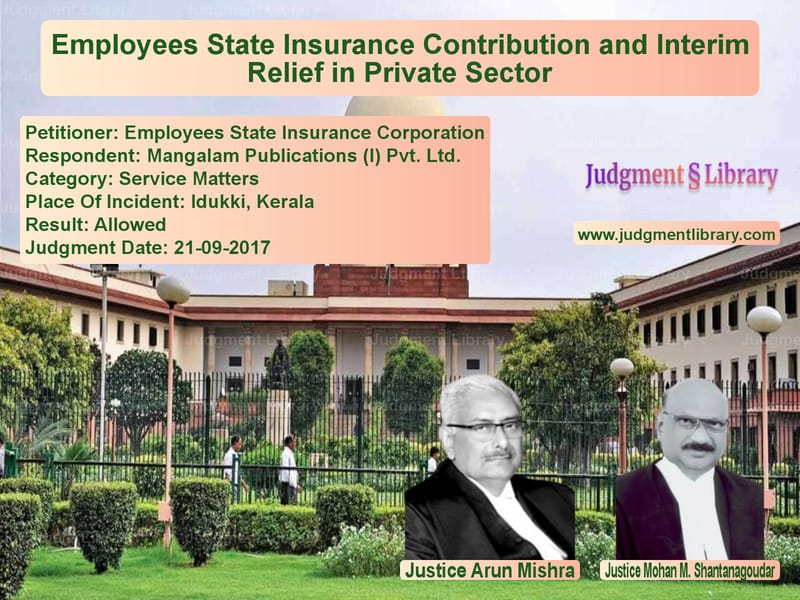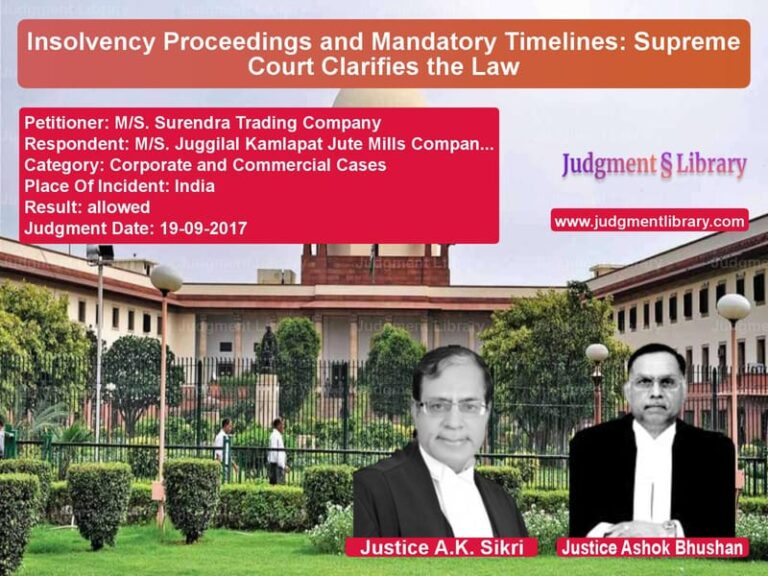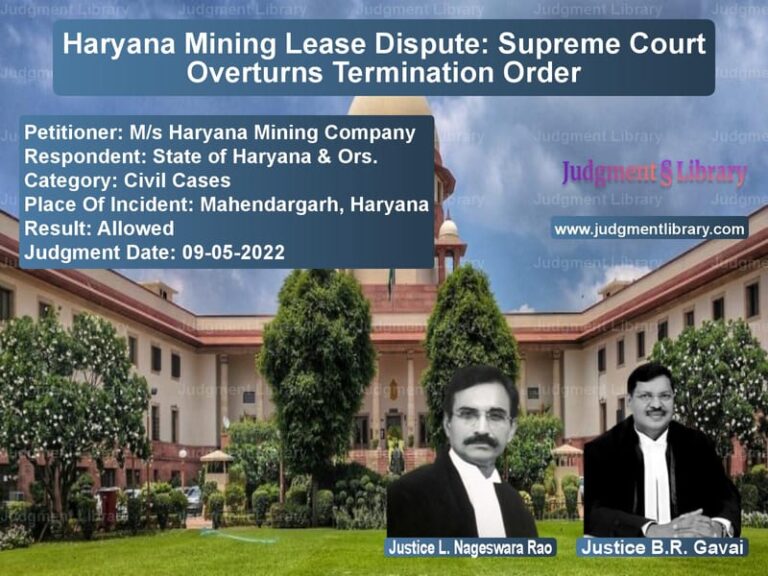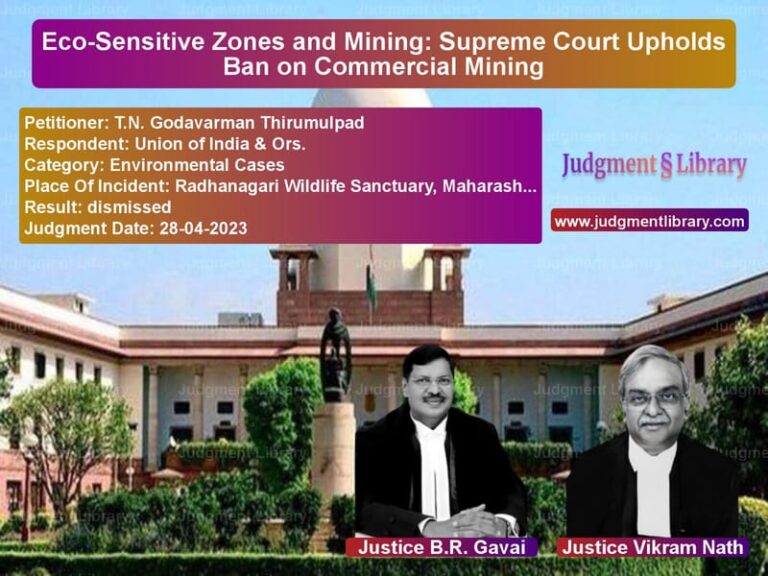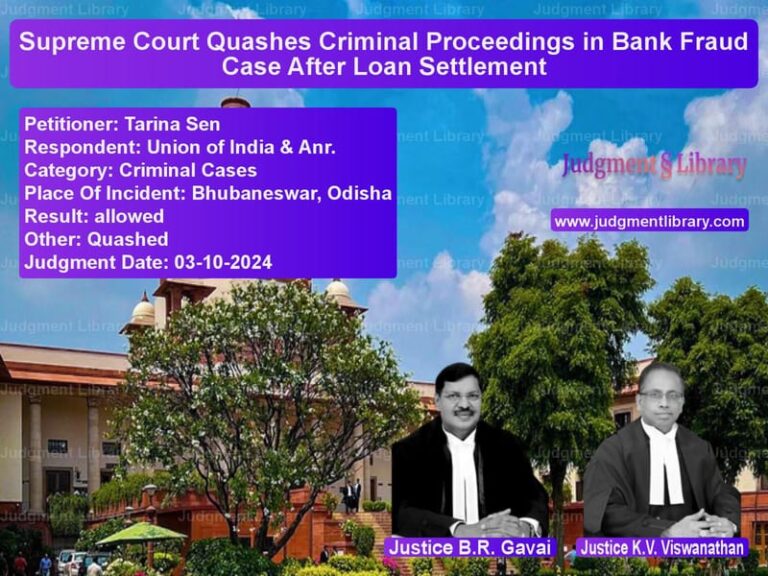Employees State Insurance Contribution and Interim Relief in Private Sector
The judgment in Civil Appeal No. 4681 of 2009 revolves around the interpretation of interim relief and its inclusion under the definition of ‘wages’ as per the Employees’ State Insurance (ESI) Act, 1948. The case was filed by Employees State Insurance Corporation (ESIC) against Mangalam Publications (I) Pvt. Ltd., which was found to have not paid the required ESI contributions on interim relief paid to its employees during the period from 01.04.1996 to 31.03.2000. The crux of the case lies in whether the amount paid as interim relief to employees during this period is to be considered ‘wages’ and, if so, whether ESI contributions are due on such payments.
Background
The respondent, Mangalam Publications, is a private limited company that operates in the printing and publishing sector. In the period under dispute, the company had paid interim relief to its employees following government notifications, specifically under the direction of the ‘Manisana Wage Board’ recommendations. However, the company did not pay the corresponding ESI contributions for the interim relief, arguing that the amount could be classified as ex-gratia payment under the provisions of the ESI Act.
Arguments of the Petitioner (Employees State Insurance Corporation)
The ESIC argued that the payment made by the respondent to its employees was ‘wages’ as defined under Section 2(22) of the Employees State Insurance Act, 1948. It was emphasized that interim relief is not excluded from the definition of wages and therefore should be subject to ESI contributions. The ESIC presented the position that the payments made as interim relief were intended as part of the employee’s regular remuneration, thus falling within the scope of ‘wages’ under the Act. This would mean that, under the provisions of the ESI Act, the respondent had an obligation to pay contributions based on the interim relief paid to its employees.
Arguments of the Respondent (Mangalam Publications)
The respondent contended that the interim relief was a temporary, ex-gratia payment provided to employees during the period of wage revision and therefore could not be classified as ‘wages’ for the purposes of ESI contributions. The respondent relied on an office memorandum dated 19.08.1998 issued by the Government of India, which it argued exempted such interim payments from being treated as wages for statutory contributions. According to the respondent, the office memorandum clearly stated that the payments made as interim relief did not constitute part of the regular wage structure and, as such, should not attract the liability for ESI contributions.
Court’s Observations
The Court, while addressing the issue of interim relief being categorized as wages under the ESI Act, referred to the definition of ‘wages’ under Section 2(22). It was noted that the term ‘wages’ is broad enough to include any remuneration paid under the terms of the contract of employment, whether express or implied. This includes interim relief payments made during wage revisions, as they were an integral part of the employee’s compensation during the relevant period. The Court made it clear that the exclusion clauses under Section 2(22) are specific in nature and do not apply to the interim relief paid by the respondent. In addition, the Court discussed how the law, being a welfare legislation, must be interpreted in a way that benefits the employees.
The Court also highlighted that the office memorandum cited by the respondent did not apply in this case, as it pertained specifically to Central Public Sector Enterprises (PSES) and not to private sector undertakings. Furthermore, the High Court’s earlier judgment, which classified the interim relief as ex-gratia payment, was found to be legally incorrect as it overlooked the nature of the payment as part of wages. This misinterpretation of the law led to the High Court’s decision being overturned by the Supreme Court.
Conclusion
The Supreme Court held that the interim relief paid by Mangalam Publications to its employees was indeed ‘wages’ as defined under Section 2(22) of the Employees State Insurance Act. Consequently, the company was liable to pay ESI contributions on these payments. The Court set aside the High Court’s decision and restored the ruling of the Employees’ State Insurance Court, directing the respondent to pay the required contributions. The Court emphasized that the Employees State Insurance Act is a welfare legislation and should be interpreted with the intention of benefiting the employees it seeks to protect.
Don’t miss out on the full details! Download the complete judgment in PDF format below and gain valuable insights instantly!
Download Judgment: Employees State Insu vs Mangalam Publication Supreme Court of India Judgment Dated 21-09-2017.pdf
Direct Downlaod Judgment: Direct downlaod this Judgment
See all petitions in Employment Disputes
See all petitions in Pension and Gratuity
See all petitions in Public Sector Employees
See all petitions in Judgment by Arun Mishra
See all petitions in Judgment by Mohan M. Shantanagoudar
See all petitions in allowed
See all petitions in supreme court of India judgments September 2017
See all petitions in 2017 judgments
See all posts in Service Matters Category
See all allowed petitions in Service Matters Category
See all Dismissed petitions in Service Matters Category
See all partially allowed petitions in Service Matters Category

